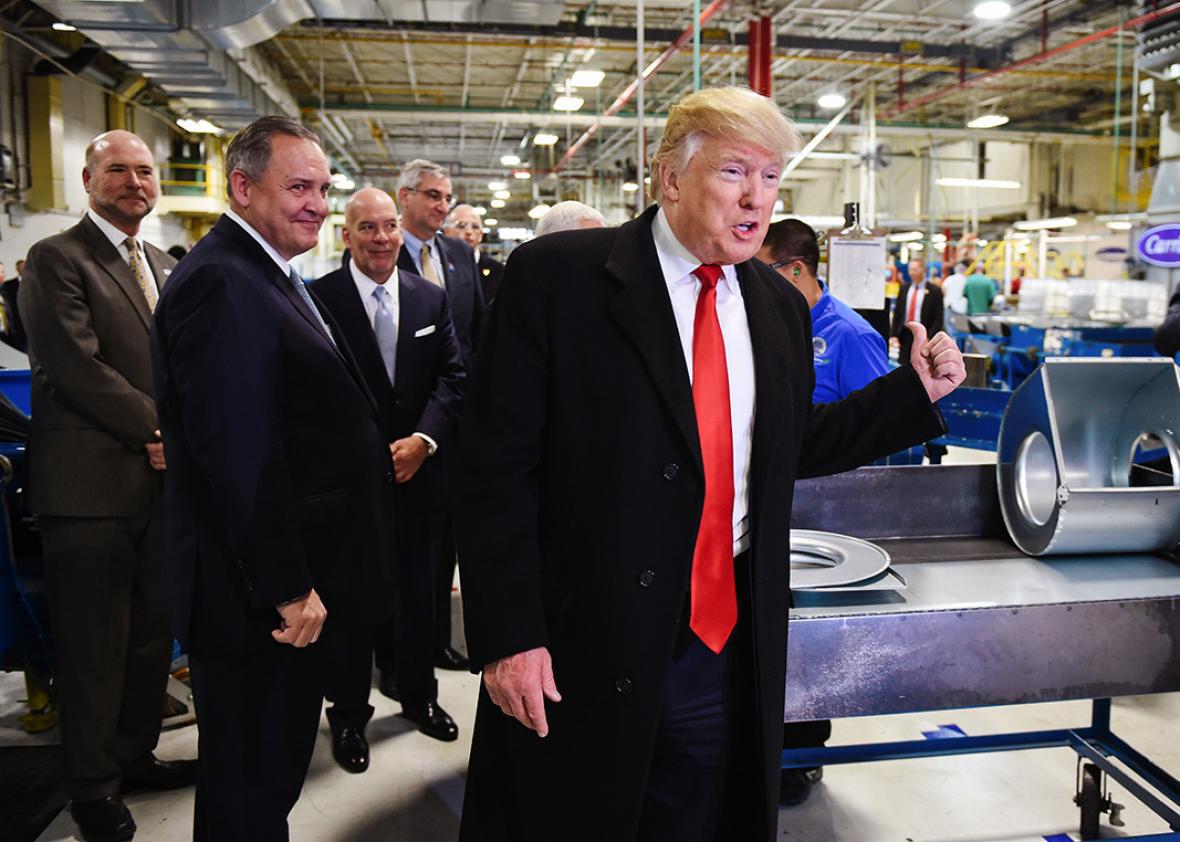On Thursday, Donald Trump held one of his first public events since winning the presidency, appearing in Indianapolis to announce a deal he brokered to keep American jobs in the U.S. During the campaign, he had routinely harped on the fact that Carrier Corp. planned to move 1,400 jobs to Mexico from an air-conditioning plant in Indiana. Under a Trump presidency, he promised, that kind of offshoring would stop. And so this week, Trump, Vice President–elect Mike Pence, and Carrier announced that the company would keep 1,000 jobs in Indianapolis in exchange for some $700,000 in annual tax incentives.
This is the first example we’ve seen of Trump’s conception of the president as the dealmaker in chief. And it seems, well, small. Negotiating with companies over the fate of a few hundred or a few thousand jobs is something that governors do all the time. For decades, shrewd companies have played states off one another, demanding and getting tax breaks, training dollars, infrastructure spending, or cheap power in exchange for either agreeing to move—or agreeing not to move away (as Slate’s Henry Grabar noted Wednesday). Earlier this year, Massachusetts offered General Electric a nine-figure package of inducements to move its headquarters from Fairfield, Connecticut, to downtown Boston. Desperate to hold onto large employers, Connecticut last month offered eight-figure retention inducements to two absurdly large and profitable hedge funds run by jerky libertarians.
But it’s truly rare for a president to get involved in such efforts, because the return on investment of time is typically vanishingly small. Trump bargained for 1,000 jobs. In November, according to ADP, the private sector created 216,000 jobs, or about 800 every three hours. Over the last 73 months, under the Obama administration, the economy has created 14.5 million jobs. Getting macroeconomic policy right, obviously, matters a lot more than micromanaging individual companies. If Trump can’t nail the former, the latter won’t mean much no matter how good it looks as a photo op.
Second, rather than signal a fresh new attitude about the relationship between government and business, the Carrier episode may actually contribute to a sense that the system is rigged. Only big, highly profitable multinational corporations tend to get these kind of bespoke deals and the concomitant attention. Companies that employ lots of people, hire lobbyists, and have the resources and ability to move jobs are able to get tax breaks, infrastructure assistance, and other governmental assistance. (Carrier, in fact, was already getting incentives to keep to jobs in Indiana.) But if you own a restaurant or a chain of convenience stores or a small welding shop, the government is essentially indifferent to your plight. It won’t take long for Americans to notice who gets a deal under the Trump administration.
It works the other way, too: Carrier’s parent company, United Technologies, is one of the nation’s largest defense contractors. It provides lots of goods and services to the government under a series of contracts that the government entered under its own volition. The clear subtext of this episode is that a Trump administration would move to harm the business interests of a conglomerate if one of its units were to act in a thoroughly legal manner that upsets the government. If we’ve now entered an era in which presidential vindictiveness can influence the decisions of the private sector, that’s not particularly heartening.
It is somewhat refreshing to see politicians take an interest in the impacts of offshoring. At some level, we are probably better off having those jobs here rather than move, even if readily handing Carrier a carrot means other companies will know they can shake down the Trump administration by threatening to take jobs elsewhere. The nice thing about manufacturing is that calls into action a large supply chain and a range of other services: suppliers, transport, security, accounting. The more people that remain employed on a factory floor in the U.S., the more people are employed funneling them the stuff they need to assemble sophisticated machines. And too many policymakers and economists have simply explained away the phenomenon of offshoring as a simple matter of businesses pursuing comparative advantage.
Something tells me, however, that Trump, who has a notoriously short attention span, will be highly selective in the companies he calls out and pursues. He’s likely to be much more interested in the symbolic PR stunt of saving a few hundred jobs at one advanced manufacturer than in, say, investing in the training, R&D, or education programs that would enable all advanced manufacturers to compete more effectively in the U.S. Rather than helping particular companies, presidents should focus on entire industries or the macroeconomic climate. Of course, some businesses will respond to state incentives and presidential pressure. But when you set up the right trade deals, tax system, and infrastructure, a much broader range of companies will respond—without the president’s involvement.
There’s one more way this move is classic Trump. While he negotiated the deal, the transaction is actually between the state and Indiana. In other words, the president-elect is continuing his lifelong habit of using other people’s money for personal gain—this time for political gain. He gets the political profits, and Indiana’s taxpayers are stuck with the bill. Welcome to the Trump administration.
